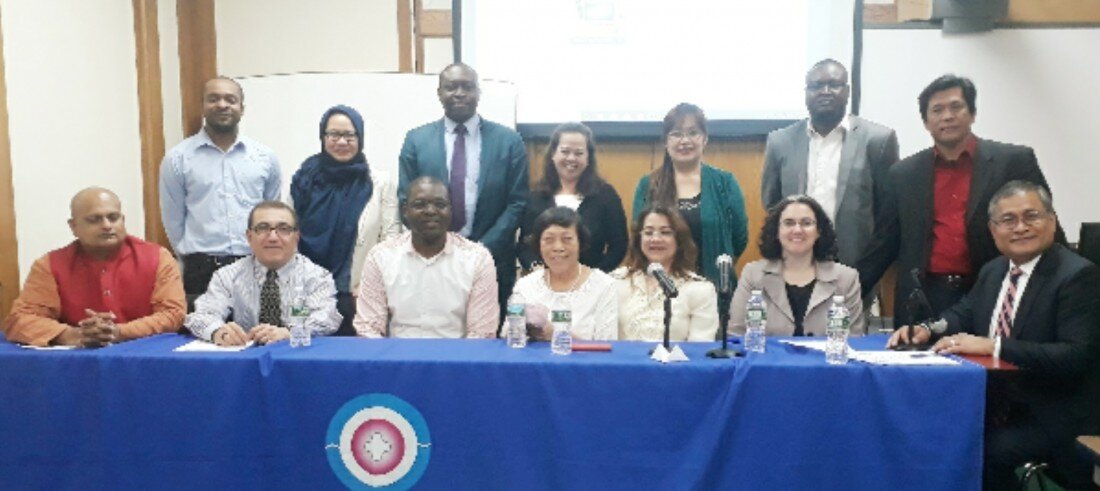PEACE IN THE MIDST OF DIVERSITY INTERFAITH EVENT
As a facet of peacemaking, Women’s Federation for World Peace (WFWP) encourages intercultural and interfaith networking and communication as a way to discover the universal bonds that connect us as people. Connecting across differences generates tolerance, acceptance, and love, apart from the all too common distance, ignorance, and hate.
Our WFWP Chairwoman in Pennsylvania, Jizly Dohou, who is also pursuing her Masters in Religious Studies, was asked to plan an Interfaith Dialogue on the theme “Peace in the Midst of Diversity” as part of her studies. The following depicts the rich main points of the diverse speakers, which we felt pertinent to those looking to make peace a reality in their own communities.
Emmanuel Ndupu began with the guidelines on conducting dialogue. These points were laid out as RESPECT: responsibility, empathy, sensitive, ponder, examine, confidentiality, and tolerance.
The highlight of the program was the first Hindu speaker, Dr. Dileepkumar Thankappan, who is the founder and president of World Yoga. He is also involved in the field of promoting interfaith at the United Nations and is currently an advisor of UNSRC-Wellness network. He explained how we are all equal according to Hindu tradition. His experimentation in religious faiths has exposed him to various places, cultures, and religions. “Starting a Universal family” is one of the visions of Hinduism. He emphasizes how the structures of planets parallels the alignment of our body system and the vital parts of human beings. The active points in our body can make a substantial change in our life, if discovered.
The second speaker was from the Islamic tradition: Imam Mahmoud Hamza. He stressed the message, “Let’s keep faith between us and God. Arguments about faith are nonsense.” The Qur’an teaches followers to “be firm and just,” as well as to be moderate and humble, and to bestow mercy on every man on Earth. Faith should remain a personal relationship between individuals and God, instead of a source of conflict between people. We need to find common ground to work together and to agree on what we are going to do for the sake of peace.
The third speaker was Sukhant Convery, representing Buddhism. The way of life of Buddhism is to accept everybody, despite their different faith beliefs. She helped us get into the proper mindset to receive the teachings of Buddha by meditation, a centuries-old practice of the religion.
Representing Christianity, specifically Catholicism, Bishop Joy Theriot promoted peace by stressing the traditional concept in family. She referred to and honored Mother Teresa as a peacemaker who sent a message of taking care of one’s family, which must be the main goal in spreading peace. She also emphasized that a mother needs to take the lead in establishing peace in her family, and spread an unending love to everyone.
Our fifth speaker was Tal Zorer, representing the Jewish faith. She was born and raised in Israel in a traditional Jewish family. She earned a law degree at a Jewish university and participated in a Middle East Peace Initiative. Although she is not a Jewish scholar, she has demonstrated a strong interest in interfaith work as a way of understanding peace. The Torah encourages accepting diverse opinions. From her point of view, a religion should not focus on gaining more members, but rather on being sincere as a way of strengthening one’s faith and practicing interfaith work. Taking away the anxiety of having others trying to convert one will allow everyone to share a cooperative spirit and work together.
The audience was given an opportunity to ask questions. The first question addressed the roles of religious leaders in spreading peace despite the differences among people. The Hindu speaker, Dr. Dileepkumar Thankappan, explained that following one’s ethics and values, and having the heart of a servant, are key to eradicating conflict.
According to Imam Mahmoud Hamza, religious leaders should uphold moral standards and respect the commonalities between us through respect and care. They should educate their congregations of the beliefs of other religious groups. The more we work together and the more we get to know each other, the less conflict there will be. Although everyone has their own way of worshipping God, this should not stop them from working together.
Another step towards peaceful collaboration is putting aside political differences and loving people despite the polarization in our country.
The speakers agreed unanimously that treating someone as a family member and creating more interfaith gatherings are effective methods of attaining “peace in the midst of diversity.” The cooperation and collaboration that a joint project generates will be the best denominator in creating a network of peace and helping people put aside their differences.


